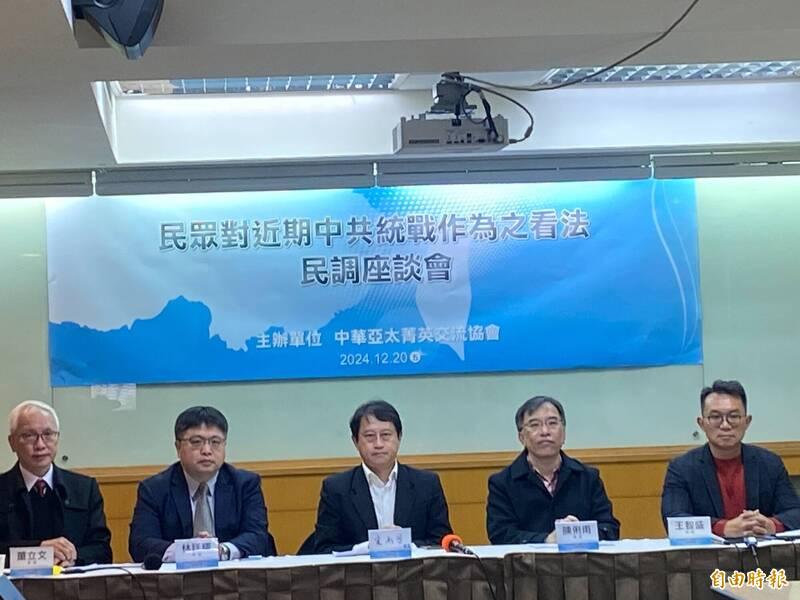Results from a public poll carried out by the Association of Chinese Elite Leadership have revealed that only 37.9 percent of 20- to 24-year-olds believe that the law should be amended to prevent Taiwanese influencers from collaborating with the Chinese Communist Party (CCP) to push “united front” propaganda on social media, which was lower than all other age brackets polled.
The results are a warning signal of the long-term effects of exposing Taiwanese youth to Chinese social media platforms such as Xiaohongshu (小紅書, “Little Red Book”), as they have become less alert to “united front” propaganda, Association of Chinese Elite Leadership secretary-general Wang Chih-sheng (王智盛) said.
The association held a meeting today to discuss the results of the survey, titled “Public perception of China’s recent ‘united front’ tactics,” which was carried out by Dadi Opinion Research using landline telephone calls on Tuesday and Wednesday to survey 1,001 participants over the age of 20, it said.

Photo: Chung Li-hua, Taipei Times
Earlier this month, the Ma Ying-jeou Foundation invited a group of Chinese students to Taipei, which sparked protests after a member of the Chinese delegation referred to Taiwan’s national baseball team as “China Taipei.”
The survey revealed that 35.6 percent of respondents believed the Ma Ying-jeou Foundation should bear responsibility, while 15 percent believed it should be the visiting delegation.
When asked whether they believed the law should be changed to prevent Taiwanese influencers from collaborating with the CCP to create “united front” propaganda, 56.3 percent agreed, 25.7 disagreed and 18 percent did not state an opinion, survey data showed.
The CCP “buying” Taiwanese influencers to push propaganda was recently exposed and so was added to the survey, Wang said.
Looking at the survey results as a whole, the findings should make the government consider amendments to the law, he said, though many factors must first be considered such as freedom of speech, human rights and threats to national security.
The Chinese Nationalist Party (KMT) always says that the more fraught cross-strait relations become, the more the two sides must communicate, however if exchanges do not take into consideration Taiwanese sovereignty or foster mutual respect, Taiwan could fall into the CCP’s trap and become a base for Chinese nationalism, Taiwan Thinktank committee member Tung Li-wen (董立文) said.
Amending the law to prohibit such behavior would not be easy, as it would be difficult to prove that the CCP is funding and controlling such propaganda, Tung said, advising the government to increase the penalties outlined in applicable and pre-existing laws.
Concerns about the CCP targeting Taiwanese influencers have also been raised by Mainland Affairs Council (MAC) Deputy Minister Liang Wen-chieh (梁文傑), who held a media conference on Dec. 11, saying that the practice is ongoing, and while the CCP previously mainly used traditional media, entertainers and actors, a much bigger threat now is the use of influencers to sway Taiwan’s public opinion, an important tactic in the CCP’s “war on information” being waged against Taiwan.

Nipah virus infection is to be officially listed as a category 5 notifiable infectious disease in Taiwan in March, while clinical treatment guidelines are being formulated, the Centers for Disease Control (CDC) said yesterday. With Nipah infections being reported in other countries and considering its relatively high fatality rate, the centers on Jan. 16 announced that it would be listed as a notifiable infectious disease to bolster the nation’s systematic early warning system and increase public awareness, the CDC said. Bangladesh reported four fatal cases last year in separate districts, with three linked to raw date palm sap consumption, CDC Epidemic Intelligence

Two Taiwanese prosecutors were questioned by Chinese security personnel at their hotel during a trip to China’s Henan Province this month, the Mainland Affairs Council (MAC) said yesterday. The officers had personal information on the prosecutors, including “when they were assigned to their posts, their work locations and job titles,” MAC Deputy Minister and spokesman Liang Wen-chieh (梁文傑) said. On top of asking about their agencies and positions, the officers also questioned the prosecutors about the Cross-Strait Joint Crime-Fighting and Judicial Mutual Assistance Agreement, a pact that serves as the framework for Taiwan-China cooperation on combating crime and providing judicial assistance, Liang

Reports of Taiwanese going missing, being detained or interrogated, or having their personal liberties restricted in China increased about fourfold annually last year, the Mainland Affairs Council (MAC) said yesterday. Last year, 221 Taiwanese who traveled to China were reported missing, were detained and interrogated, or otherwise had their personal freedom restricted, up from 55 the previous year, the council said. Reopening group tours to China would be risky, as it would leave travelers with no way to seek help through official channels after Beijing shut down dialogue between the associations tasked with handling cross-strait tourism, the MAC said. Taipei’s Taiwan Strait Tourism

SHIFT: Taiwan is evolving from a transit stop into a tourist destination, with more international travelers willing to spend on tours, dining and cultural activities Taiwan rose three places in the World Tourism Barometer to 36th globally in 2024, with international tourism revenue of US$10.028 billion, the Tourism Administration said on Monday. The UN Tourism Organization publication said that its focus has switched from whether a country has returned to pre-COVID-19 levels of tourism to the amount spent by a tourist during an overseas trip. The nation last year welcomed 8.57 million international tourists, about 9 percent more than in 2024, with most tourists coming from Japan, South Korea, and Hong Kong and Macau, all of which accounted for at least 1 million tourists each. During the first